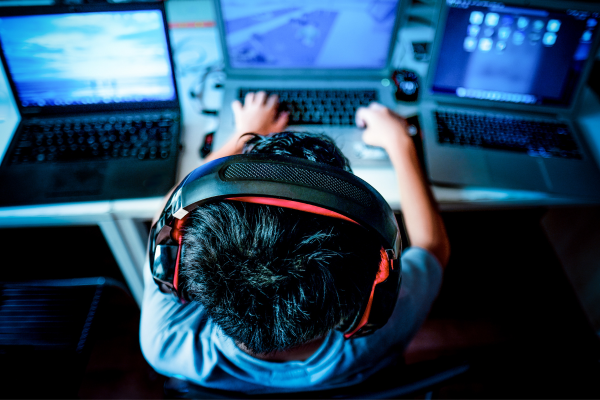In case you missed it see what’s in this section
Let's Talk
Your Total Guide To lifestyle

Mindfulness and Gaming: Finding Balance
Explore how mindfulness enhances gaming. Learn about setting boundaries, managing emotions, and achieving a balanced, healthy gaming lifestyle.
In an era where the digital realm perpetually expands, online gaming has burgeoned into a colossal industry, captivating millions worldwide. This meteoric rise can be attributed to technological advancements, the proliferation of mobile devices, and the increasing ubiquity of internet connectivity, making gaming an accessible and ubiquitous pastime. As the virtual gaming world becomes ever more immersive, there emerges a pressing need to understand and harness its impact on our lives.
Concurrently, the ancient practice of mindfulness, a method rooted in being fully present and engaged in the moment, has seen a renaissance, offering solace in our frenetic modern world. The juxtaposition of these two realms – the high-octane world of online gaming and the tranquil discipline of mindfulness – may seem incongruous at first glance. However, this article delves into the symbiosis of these two spheres, exploring how mindfulness can be seamlessly integrated into the gaming experience. By doing so, we postulate that mindfulness techniques can significantly elevate responsible gaming experiences, thereby fostering a harmonious lifestyle equilibrium. This fusion aims to harness the joy and engagement of gaming while mitigating potential negative impacts on mental health and well-being.
Thus, this exploration seeks to unravel how mindfulness can transform gaming into a tool for positive mental health, rather than a mere escape from reality. We embark on a journey to discover how mindful gaming can enhance self-awareness, control, and enjoyment, leading to a more balanced and fulfilling interaction with the digital world.
The Psychological Landscape of iGaming
Gaming, a labyrinthine world of immersion and escapism, taps into complex psychological mechanisms, including reward systems and emotional engagement. The intricate design of games often leads to profound immersion, where players experience a sense of being 'in the game', a phenomenon known as telepresence. This deep involvement can be both exhilarating and therapeutic, offering an escape from the stresses of daily life. However, it can also blur the line between reality and the virtual world, potentially leading to overindulgence and disconnection from real-world responsibilities.
The reward systems in gaming, particularly the use of variable reinforcement schedules, are expertly crafted to trigger the release of dopamine, a neurotransmitter associated with pleasure and reward. This can create a highly engaging and, at times, addictive experience. While these reward systems can provide a sense of achievement and satisfaction, they can also lead to compulsive gaming behaviors, especially in vulnerable individuals. The emotional impact of gaming is equally potent, with games evoking a wide range of emotions, from joy and excitement to frustration and anger.
Contemporary research into the psychological effects of gaming presents a nuanced view. Positive effects include improved problem-solving skills, enhanced creativity, and social connection when playing multiplayer games. On the flip side, excessive gaming can lead to issues such as social isolation, decreased physical activity, and disrupted sleep patterns. Particularly, the impact of gaming on mental health is an area of growing concern and study, with research exploring its link to conditions such as depression and anxiety.
Among the myriad of slot games in the iGaming sphere, 'Kitty Glitter Slots' stands out as a prime example of a game that embodies the unique psychological appeal of this genre. With its vibrant visual and auditory stimuli, it captures the essence of what makes slot games so engaging - the constant anticipation of rewards. The randomness and chance inherent in games like Kitty Glitter Slots can profoundly impact a player's mental state, often fostering a sense of excitement and suspense. Yet, this same unpredictability can also be a source of stress and anxiety, particularly when intertwined with the financial aspects of gambling. Research focusing on the mental health impact of slot games has revealed their potential to trigger compulsive behaviors and addiction. This distinct nature of slot games, characterized by their specific mechanics and reward structures, sets them apart from other forms of gaming.
Mindfulness in Gaming
Mindfulness, derived from ancient contemplative traditions, is fundamentally the practice of cultivating a heightened, non-judgmental awareness of the present moment. This includes an acute consciousness of one's internal states — thoughts, emotions, sensations — as well as the external environment. The principles of mindfulness emphasize staying in the present, acknowledging and accepting one's feelings and thoughts without getting overwhelmed or overreacting to them.
In the context of gaming, mindfulness can be a transformative tool. By staying present and conscious during gameplay, gamers can more deeply enjoy and engage with the experience, savoring each moment rather than being driven by the desire for outcomes or achievements. This heightened self-awareness also enables players to recognize their emotional responses to gaming, be it excitement, frustration, or anxiety, and to approach these emotions with a balanced perspective. Mindful gaming involves recognizing when emotions are taking control and consciously choosing to step back and regain composure.
The benefits of integrating mindfulness into gaming are multifaceted. Firstly, it enhances the overall enjoyment of the game, allowing players to experience the game more fully and richly. Mindfulness also acts as a counterbalance to the stress and intensity that can come with competitive or challenging gaming scenarios. By maintaining a mindful stance, players can reduce anxiety and frustration, leading to a more pleasant and controlled gaming experience. Importantly, mindfulness in gaming can be a critical factor in preventing over-immersion or addictive patterns. By being fully aware of the time spent gaming and the emotions elicited, gamers can make more conscious choices about their gaming habits, promoting a healthier and more balanced engagement with their gaming world.
Setting Boundaries and Recognizing Addiction
In the virtual gaming world, setting boundaries is not merely a suggestion, but a necessity for maintaining mental health and well-being. Establishing clear temporal boundaries, such as limiting gaming sessions to a specific duration, can prevent the blurring of lines between the virtual and real worlds. Emotional boundaries are equally critical, requiring players to remain cognizant of their emotional state during gameplay and to step back when emotions become overwhelming or negative.
Gaming addiction, a growing concern in the digital age, manifests through various behavioral and emotional indicators. Behavioral signs include excessive time spent gaming, neglect of personal responsibilities or social relationships, and continued gaming despite adverse consequences. Emotional indicators might encompass feelings of restlessness or irritability when unable to play, using gaming as an escape from real-life problems, or experiencing guilt or shame associated with gaming.
Amidst these challenges, mindful gaming practices emerge as a powerful tool. These include setting time limits for gaming sessions, taking regular breaks to detach and reorient oneself to the real world, and engaging in mindfulness exercises before and after gaming to maintain a balanced emotional state. The implementation of these strategies can significantly mitigate the risks associated with excessive gaming.
In the dynamic world of slot games, such as the popular Hot Twenty Slot, the allure of rapid gameplay and instant rewards significantly heightens the risk of addiction. Players engrossed in such games need to be acutely aware of addiction signs, including compulsive playing and obsessive thoughts. If you're interested in understanding how to maintain a balanced approach while enjoying these games, read this section attentively. It's crucial for players to establish firm boundaries, like setting predefined spending limits and adhering to strict gaming schedules. Recognizing and being mindful of the psychological triggers that slot games like Hot Twenty Slot activate, including the thrill of random rewards and the excitement of gambling, is vital. This awareness enables players to enjoy these games with a sense of caution and control, ensuring a healthier gaming experience.
Gaming as Part of a Balanced Lifestyle
Integrating gaming into a well-rounded lifestyle is a nuanced art that involves striking a balance between virtual adventures and real-world experiences. Moderation is key; it's crucial to ensure that gaming complements rather than dominates one's life. This involves setting aside specific times for gaming, while also engaging in other enriching activities like physical exercise, social interactions, and pursuing hobbies and interests outside the digital realm. Such diversification not only prevents overreliance on gaming for fulfillment but also enriches overall life experiences.
Gaming's role in relaxation and stress relief cannot be understated. For many, it provides a valuable outlet for decompression and enjoyment, allowing a temporary escape from the rigors of daily life. However, this escape should be part of a broader strategy for stress management that includes other healthy practices like mindfulness meditation, physical activity, and social engagement.
Case studies and personal testimonials offer concrete examples of how individuals have achieved a harmonious balance. One such case involves a professional who uses gaming as a tool to unwind after work, setting strict time limits to ensure it doesn't interfere with sleep or personal relationships. Another example is a student who combines gaming with regular exercise and study, using gaming as a reward mechanism for achieving personal goals. These real-life scenarios demonstrate the feasibility and benefits of mindful gaming as part of a holistic approach to life, one that embraces both digital delights and the richness of the physical world.
Tips for Mindful Gaming
To maintain mental and emotional well-being in the realm of online gaming, several practical tips can be invaluable. Firstly, gamers should aim to establish a routine that includes designated gaming times, ensuring that gaming does not encroach upon essential daily activities like sleep, work, or family time. Regular breaks during gaming sessions are crucial to prevent mental fatigue and maintain a clear perspective. Additionally, it's beneficial to engage in activities that promote relaxation and mindfulness outside of gaming, such as reading, yoga, or spending time in nature.
Mindfulness exercises tailored for gamers can also be highly effective. Techniques such as deep breathing exercises before and after gaming sessions, practicing gratitude by acknowledging positive gaming experiences, and maintaining a gaming journal to reflect on emotions and experiences related to gaming can enhance self-awareness and control. Mindful gaming involves being fully present during gaming, consciously enjoying the experience without being overly fixated on outcomes or achievements.
Several apps and tools can assist in fostering a mindful gaming experience. Apps that track gaming time can help in setting and adhering to gaming limits. Mindfulness and meditation apps, some of which are specifically designed for gamers, can be used to conduct guided meditation sessions, helping to calm the mind and reduce stress. Tools that provide reminders to take breaks and engage in mindfulness exercises during gaming can also be valuable in maintaining a balanced approach to online gaming.
This article has traversed the complex interplay between the realms of gaming and mindfulness. Key points include the psychological aspects of gaming, such as immersion, reward systems, and their emotional impacts; the importance of mindfulness in enhancing gaming experiences through presence, self-awareness, and emotional regulation; and practical strategies for integrating gaming into a balanced lifestyle. The discussion highlighted both the potential risks associated with excessive gaming, such as addiction, and the positive aspects like relaxation and stress relief. Importantly, it provided actionable tips for mindful gaming, including setting boundaries, engaging in mindfulness exercises, and utilizing supportive apps and tools.
The crux of this exploration has been the emphasis on mindfulness as an essential component of responsible and enjoyable gaming. Mindfulness not only augments the gaming experience but also ensures that it contributes positively to one's overall well-being. By adopting a mindful approach to gaming, individuals can enjoy the rich, immersive worlds that games offer while maintaining a healthy, balanced lifestyle. Thus, we encourage readers to embrace mindfulness in their gaming practices, seeing it as a pathway to both gaming enjoyment and personal well-being.
Weather in Bath
Listings

















